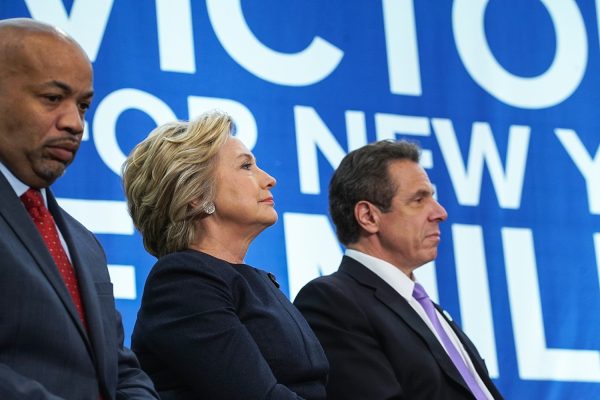
The next few years are going to be tough for Democrats. With Republicans controlling both America’s Congress and the presidency, they can tilt the balance on the Supreme Court in their favor and repeal some of the signature accomplishments of the Barack Obama Administration, from financial reform to the Iranian nuclear deal to measures on climate change to the Affordable Care Act.
Disarray
Tuesday’s unexpected election defeat has thrown the Democrats in disarray.
The downfall of Hillary Clinton, at least to some, repudiates the entire incrementalist progressivism she represented.
The defection of the white working class in big industrial states like Michigan and Pennsylvania to the Republican candidate, Donald Trump, also calls into question the wisdom of the party’s transformation from a predominantly blue- into a predominantly white-collar coalition.
In the coming years, there are going to be three major challenges:
1. Leadership
The first is leadership. Clinton could drag a whole generation of center-left Democrats who came to prominence during her husband’s tenure in the 1990s down with her.
Harry Reid is retiring as party leader in the Senate. There is a chance Nancy Pelosi will resign her leadership position in the House.
Next in line are Chuck Schumer of New York and Steny Hoyer from Maryland, respectively. Neither looks like the person who will lead the Democrats to victory again in 2020.
There are more promising figures down the ranks, like California’s new congresswoman, Kamala Harris, and Maryland’s Chris Van Hollen.
But they may be overshadowed by the tribunes of the populist left: Elizabeth Warren and Bernie Sanders.
The problem is they — like Clinton, Hoyer and Pelosi — are in their seventies.
Democratic leaders need to start making room for the next generation.
2. Split
The question of leadership is also one of party identity.
Some of those who backed Sanders during the primaries are making the argument now that he could have routed Trump.
Sanders himself has said that Trump’s victory owes much to the frustrations of a declining middle class “that is sick and tired of establishment economics, establishment politics and the establishment media.”
The Vermont senator even suggested that he might work with Trump if the latter is “serious about pursuing policies that improve the lives of working families.”
Richard Trumka, the head of the Democrat-aligned labor federation AFL-CIO, agreed that Trump’s victory is “an indictment of politics as usual.”
“The clarity of vision from the populist-left has made the muted response from the Democratic establishment more noticeable,” is how NBC News puts it.
There has long been a minority in the Democratic Party that has wanted to pull it in a more ideologically left-wing direction. That’s not the sort of party Democrats have been. Matt Grossmann and David Hopkins, two political scientist, argue in their new book, Asymmetric Politics, that Republicans are the ideological party (although that may change as a result of the non-conservative Trump’s victory); Democrats are a coalition of interest and identity groups. That is why Republicans prize ideological purity and Democrats are more inclined to compromise and govern.
3. Midterms
Whatever path Democrats choose, the 2018 midterm elections are unlikely to give them the comfort 2010 gave to the Republicans.
Daniel Berman writes at his blog, The Restless Realist, that Democrats’ prospects for taking over the Senate are daunting:
Democrats have perhaps two targets, Arizona and Nevada, and need to defend states where Clinton did worse than Walter Mondale: Indiana, Michigan, Missouri, Ohio, Pennsylvania, Wisconsin. Not to mention North Dakota.
Even in the event of a deeply unpopular Trump presidency, Democrats will almost certainly not control either chamber until 2020, Berman predicts.
